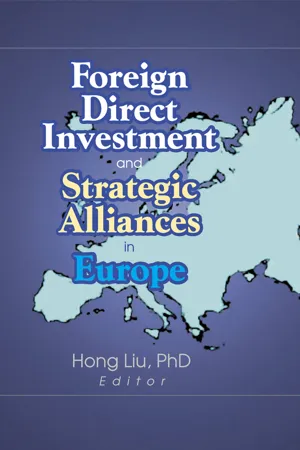![]()
International Strategic Alliances: The Impact of Behavioral Characteristics on Success
Saleema Kauser
Vivienne Shaw
SUMMARY. This paper presents the findings of a study of 114 international strategic alliances between UK firms and their European, US and Japanese partners. The research aims to assess the influence of behavioral characteristics on the success of international strategic alliances. The findings show that high levels of co-ordination, commitment, trust and communications are good predictors of international partnership success. While conflict is present in international partnerships, it is found to hinder a good performance.
[Article copies available for a fee from The Haworth Document Delivery Service: 1-800-342-9678. E-mail address: <[email protected]> Website: <http://www.HaworthPress. com> © 2001 by The Haworth Press, Inc. All rights reserved.] KEYWORDS. International strategic alliances, performance, behavioral characteristics
Introduction
Over the last two decades the world economy has been dramatically transformed. The business environment is characterized by increasing complexity, uncertainty and discontinuity. Changing market conditions, intensified global competition and increasingly shorter product life cycles mean that firms are having to re-examine the traditional methods and strategies for doing business (Ohmae 1989; Bartlett and Ghoshal 1987). Managers are realizing that, no matter how strong and resourceful their firms might be, they are no longer able to maintain a competitive advantage at every step in the value chain in all national markets, nor are they able to maintain a cutting edge in the wide range of technologies required for the design, development, manufacture and marketing of new products. Thus international strategic alliances have become an important means to rationalize operations to overcome potential difficulties and to help firms regain and maintain their competitive position in international markets (Ohmae 1989). Strategic alliances have grown in importance as a means of doing business across national boundaries receiving much attention both in the media and in academic circles (e.g., Hergert and Morris 1988; Harrigan 1988; Buckley and Casson 1988; Perlmutter and Heenan 1986; Borys and Jemison 1989; Bucklin and Sengupta 1993; Hamel 1991; Tsang 1999; Das and Teng 1999; Garai 1999; Inkpen 1998).
In spite of the increase in international strategic alliance activity in recent years it has been estimated that between 30% and 70% of alliances fail (Bleeke and Ernst 1991; Harrigan 1988; Killing 1988; Kogut 1988; Inkpen and Li 1999). This high failure rate suggests that insufficient empirical work has been undertaken to understand what characterizes successful and less successful international strategic alliances. This study aims to fill that gap by looking at the behavioral characteristics of international strategic alliances and assessing their impact on alliance success in order that managers can, in the future, develop more effective international partnerships.
Although in recent years the amount of research into international strategic alliances has increased, most studies have tended to focus on motives behind alliance formation, partner selection and the characteristics of the resulting co-operation (Contractor and Lorange 1988; Hennart 1988; Bleeke and Ernst 1991; Kogut 1988; Harrigan 1988; Blodgett 1991, Parkhe 1993; Glaister and Buckley 1996; Spekman et al. 1998, McCutcheon and Swamidas 1998). Studies focusing on success are, however, still limited (Anderson 1990; Parkhe 1993; Inkpen and Li 1999). What studies have been undertaken have focussed on the control-performance relationship with less attention being paid to behavioral aspects of the relationship (Killing 1983; Kogut 1988; Beamish 1985). Furthermore, recent empirical studies have tended to be based within the context of China and the US (e.g., Lin and Germain 1998; Chen and Boggs 1998; Glaister and Wu 1994; Lyles et al. 1999). Even where there is research of a more behavioral nature the studies have tended to concentrate on the problems associated with managing a strategic alliance rather than on what makes an alliance successful (Johnson 1999).
While some studies have started to consider behavioral characteristics these have tended to focus on co-marketing and supplier-dealer type relationships (Mohr and Spekman 1994; Lane and Beamish 1990; Bucklin and Sengupta 1993) or on strategic alliances within one country (Olson and Singsuwan 1997). There appear to be no studies which specifically consider behavioral characteristics in international strategic alliances. This study seeks to address this gap by studying the behavioral characteristics of international strategic alliances between UK firms and their US, European and Japanese partners and what impact they have on success...
